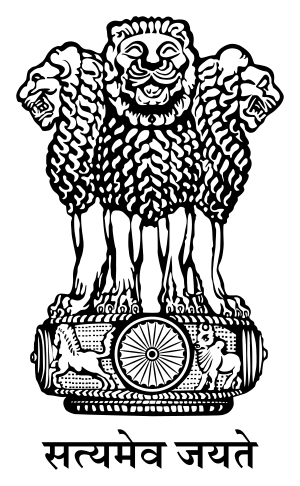Coat of Arms of India facts for kids

The National Emblem of India is a very important symbol for the country. It shows four lions and is officially called the 'National emblem'. This special symbol was inspired by the Sarnath Lion Capital. This ancient pillar was built by the great Indian emperor Ashoka around 250 BC. He made it from a single piece of polished sandstone. You can see this emblem on all Indian money, passports, and coins. When you look at the symbol from the front, you usually see three lion heads, because the fourth one is hidden. India adopted this emblem on January 26, 1950, which was the day India became a republic.
Contents
India's National Emblem
The lions on the emblem stand for royalty, courage, and pride. They show the strength and importance of the nation.
What the Symbols Mean
Below the lions, there is a wheel called the Ashoka Chakra, or Dharmachakra. This wheel comes from Buddhism and represents truth and honesty. It also symbolizes movement and progress.
You will also see a horse and a bull on the emblem. The horse represents speed, energy, and loyalty. The bull stands for hard work, strength, and determination. There are four Ashoka Chakras in total around the emblem, and two horses and two bulls.
The Motto: Satyamev Jayate
Underneath the emblem, you'll find a famous saying in an ancient language called Sanskrit: Satyamev Jayate. This phrase can be broken down into three words:
- Satyam means truth.
- Ev means only.
- Jayate means wins or triumphs.
So, the whole phrase means, "Only the truth will win" or "The truth alone triumphs." This powerful message reminds everyone about the importance of honesty and truth in society. It teaches that even if there are lies, the truth will always come out and be victorious in the end.
Images for kids
-
The original Lion Capital of Ashoka, 3rd century BCE, Sarnath Museum.
See also
 In Spanish: Emblema nacional de la India para niños
In Spanish: Emblema nacional de la India para niños
 | James Van Der Zee |
 | Alma Thomas |
 | Ellis Wilson |
 | Margaret Taylor-Burroughs |


